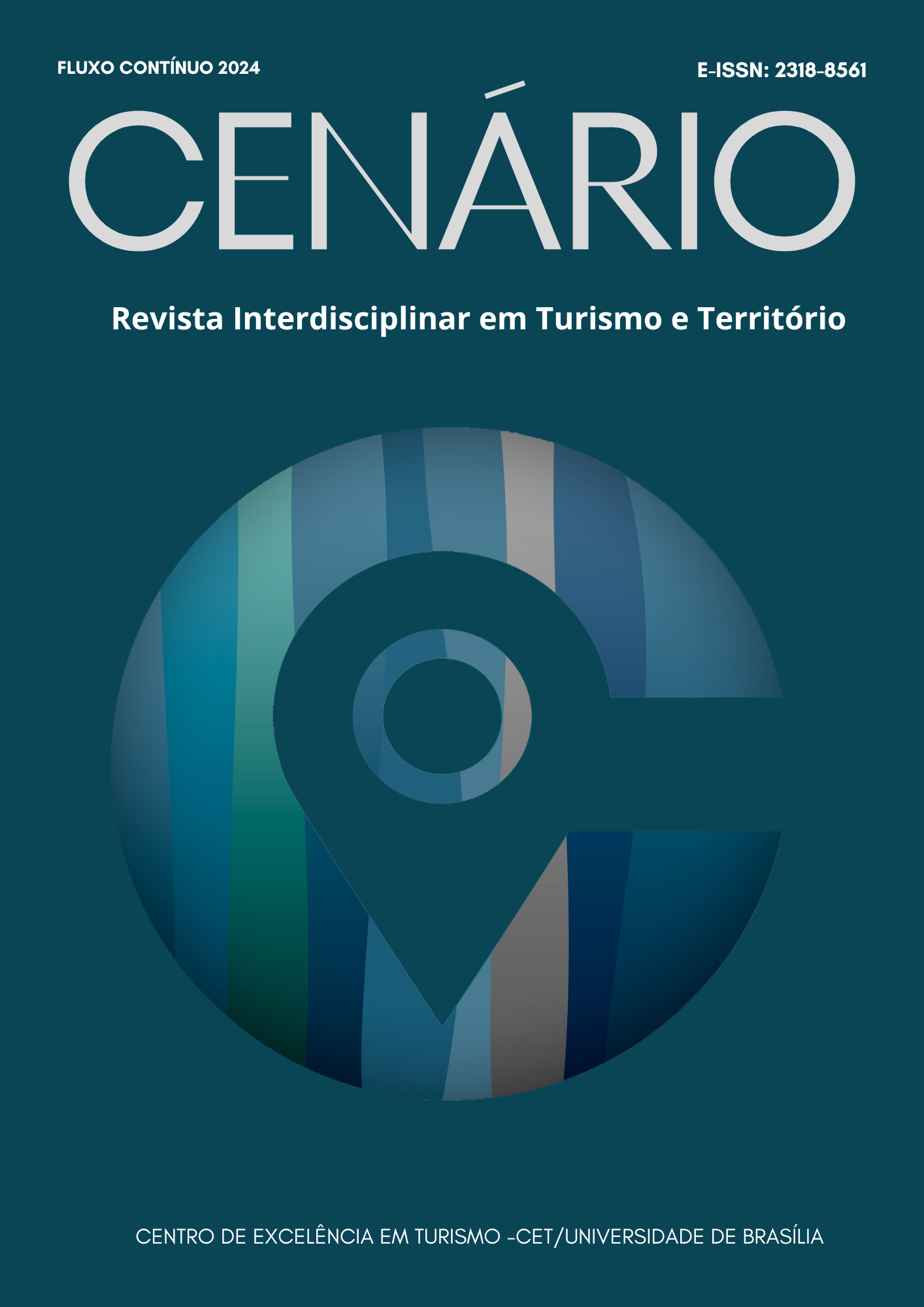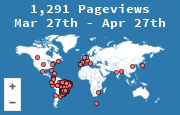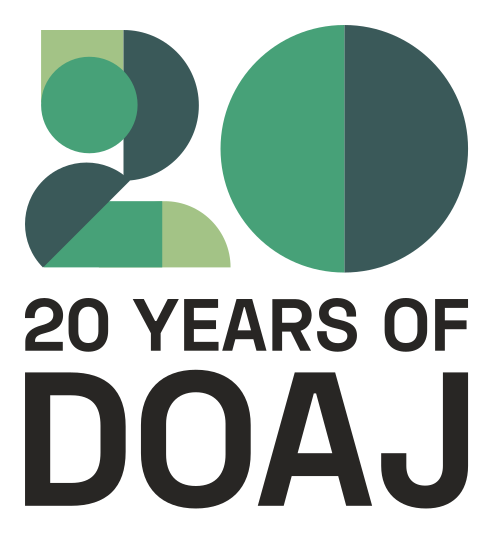Accessibility in tourism: identifying patterns and trends
identificando padrões e tendências
DOI:
https://doi.org/10.26512/rev.cenario.v12i1.51305Keywords:
accessible tourism, disabled persons, inclusionAbstract
This study aimed to identify patterns and trends in accessibility in tourism, based on literature in the area. To carry out a comprehensive categorization of the state of the art on accessibility in tourism, we carried out a systematic literature review of the qualitative meta-synthesis type, followed by content analysis. There was a deepening of research in the area, with some gaps: lack of studies on regulations and legislation aimed at people with disabilities (PWD) in tourism; lack of studies on the specific conditions that affect mobility and on the participation of PWD in tourism management positions. The findings point to environmental, personal and health factors that, in balance, can shape the ideal conditions for the enjoyment of accessible tourism, highlighting the need to define and measure accessibility accurately
Downloads
References
Adam, I. (2019). Accommodators or non-accommodators? A typology of hotel frontline employees’ attitude towards guests with disabilities. International Journal of Hospitality Management, 82(May 2018), 22–31. https://doi.org/10.1016/j.ijhm.2019.03.010
Azevedo, G. A., Sampaio, R. R., Filho, A. S. N., Moret, M. A., & Murari, T. B. (2021). Sustainable urban mobility analysis for elderly and disabled people in São Paulo. Scientific Reports, 11(1), 1–10. https://doi.org/10.1038/s41598-020-80906-w
Bardin, L. (1977). Análise de Conteúdo. In Revista Educação (Vol. 22, Issue 37). Edições 70.
Bauer, M. W., & Gaskell, G. (2008). Pesquisa qualitativa com Texto, imagem e som. Tradução de P. A. Guareschi (ed.). Vozes.
Brasil. (1988). Constituição da República Federativa do Brasil. Recuperado de: https://www.planalto.gov.br/ccivil_03/constituicao/constituicao.htm
Brasil. (1989). Lei nº 7.863, de 1989. Diário Oficial da União.
Brasil. (1990). Decreto nº 98.822, de 12 de janeiro de 1990. Diário Oficial da União.
Brasil. (2007). Convenção internacional sobre os direitos das pessoas com deficiência. Tradução Oficial/Brasil. ONU.
Brasil. (2009). Decreto nº 6.949, de 25 de agosto de 2009. Diário Oficial da União.
Brasil. (2011). Decreto nº 7.612, de 17 de novembro de 2011. Diário Oficial da União.
Brasil. (2012). Turismo Acessível. Ministério Do Turismo. Recuperado de: https://turismoacessivel.gov.br/
Brasil. (2015). Estatuto da Pessoa com Deficiência. Brasília: Senado Federal, Coordenação de Edições Técnicas, 50 p. Conteúdo: Lei no 13.146/2015. ISBN: 978-85-7018-977-6
Buhalis, D., & Darcy, S. (2010). Accessible tourism: Concepts and issues. In Accessible Tourism: Concepts and Issues. https://doi.org/10.1080/21568316.2011.603886
Buhalis, D., Darcy, S., & Ambrose, I. (2012). Best Practice in Accessible Tourism: Inclusion, Disability, Ageing Population and Tourism (v. 53). Chanel View Publication.
Carneiro, M. J., Alves, J. P., Eusébio, C., Saraiva, L., & Teixeira, L. (2022). The role of social organisations in the promotion of recreation and tourism activities for people with special needs. European Journal of Tourism Research, 30, 1–25. https://doi.org/10.54055/ejtr.v30i.2153
Cassia, F., Castellani, P., Rossato, C., & Baccarani, C. (2021). Finding a way towards high-quality, accessible tourism: the role of digital ecosystems. TQM Journal, 33(1), 205–221. https://doi.org/10.1108/TQM-03-2020-0062
Chung, J. Y., & Lee, H. (2019). Desired recreation companionship and travel behaviour of people with disabilities. Asia Pacific Journal of Tourism Research, 24(4), 314–324. https://doi.org/10.1080/10941665.2018.1564343
Clemente Soler, J. A., Bote Díaz, M., Sánchez Vera, P., & Rodriguez Guillén, D. (2019). MANAGER’S KNOWLEDGE AND AWARENESS TOWARDS ACCESSIBLE TOURISM IN THE REGION OF MURCIA / Conocimiento y percepción del gerente hacia el turismo accesible en la Región de Murcia. Gran Tour, 109–126.
Convenção sobre os Direitos das Pessoas com Deficiência (2011). Protocolo Facultativo à Convenção sobre os Direitos das Pessoas com Deficiência. Decreto Legislativo n.o 186/2008. Decreto nº. 6.949/2009 (4.a ed.). Brasília.
Costa, J., Montenegro, M., & Gomes, J. (2020). Tourism – ten possible solutions for a more inclusive society. Worldwide Hospitality and Tourism Themes, 12(6), 775–779. https://doi.org/10.1108/WHATT-07-2020-0081
Darcy, S., & Dickson, T. J. (2009). A whole-of-life approach to tourism: The case for accessible tourism experiences. Journal of Hospitality and Tourism Management, 16(1), 32–44. https://doi.org/10.1375/jhtm.16.1.32
Darcy, S., McKercher, B., & Schweinsberg, S. (2020). From tourism and disability to accessible tourism: a perspective article. Tourism Review, 75(1), 140–144. https://doi.org/10.1108/TR-07-2019-0323
De Pascale, A., Meleddu, M., Abbate, T., & Pellicano, M. (2023). Is There a Gender Gap in the Propensity to Travel of People With Disabilities? Journal of Travel Research, 62(3), 517–539. https://doi.org/10.1177/00472875211073976
Dukhovnaya, L., Kosareva, N., Adashova, T., & Agamirova, E. (2021). Comparative Analysis of the Development Trends of Barrier-Free Tourism: International and Russian Practice. Turismo: Estudos & Práticas (UERN), Caderno Su, 1–11. [ISSN 2316-1493]
Farkas, J., Raffay, Z., & Dávid, L. D. (2022). Fundamental Accessibility and Technical Accessibility in Travels—The Encounter of Two Worlds Which Leads to a Paradigm Shift. Sustainability (Switzerland), 14(7). https://doi.org/10.3390/su14073765
Freund, D., Cerdan Chiscano, M., Hernandez-Maskivker, G., Guix, M., Iñesta, A., & Castelló, M. (2019). Enhancing the hospitality customer experience of families with children on the autism spectrum disorder. International Journal of Tourism Research, 21(5), 606–614. https://doi.org/10.1002/jtr.2284
Fryer, L. (2021). Accessing access: the importance of pre-visit information to the attendance of people with sight loss at live audio described events. Universal Access in the Information Society, 20(4), 717–728. https://doi.org/10.1007/s10209-020-00737-4
Gillovic, B., & McIntosh, A. (2020). Accessibility and inclusive tourism development: Current state and future agenda. Sustainability (Switzerland), 12(22), 1–15. https://doi.org/10.3390/su12229722
Gillovic, B., McIntosh, A., Cockburn-Wootten, C., & Darcy, S. (2021). Experiences of tourists with intellectual disabilities: A phenomenological approach. Journal of Hospitality and Tourism Management, 48(May), 155–162. https://doi.org/10.1016/j.jhtm.2021.06.003
Gondos, B., & Nárai, M. (2019). The opportunities in accesssible tourism. Annals Oof Economics and Public Administration, 19 (1 (29)), 48–57.
Gregory, S. F. (2022). Diving with dignity? Older women scuba divers, constraints and accessible tourism on the Great Barrier Reef. Annals of Leisure Research, 0(0), 1–21. https://doi.org/10.1080/11745398.2022.2041449
Harju-Myllyaho, A., & Jutila, S. (2016). Viewpoints on inclusion in tourism – From accessible tourism to accessible hospitality view. Tourism Survey, 12(2), 33–44. https://journal.fi/matkailututkimus/article/view/95755/54161
Hernández, A. M. C., Baltazar, E. B., Enríquez, P. L., & Ríos, R. M. (2019). The perception of accessible tourism for people with disabilities, the case of the El Arcotete Ecotourism Center, Chiapas, Mexico. El Periplo Sustentable, 37, 100–133.
Huang, L., & Lau, N. (2020). Enhancing the smart tourism experience for people with visual impairments by gamified application approach through needs analysis in Hong Kong. Sustainability (Switzerland), 12(15), 0–27. https://doi.org/10.3390/su12156213
Instituto Muito Especial. (2011). Novos Rumos - Promoção dos Destinos Brasileiros de Acessibilidade. Turismo Muito Especial. 220 páginas.
Johnson, A., Tucker, R., Chau, H. W., & Jamei, E. (2022). Accessible and Inclusive Cities: Exposing Design and Leadership Challenges for Bunbury and Geelong. Urban Planning, 7(4), 1–12. https://doi.org/10.17645/up.v7i4.5568
Kamyabi, M., & Alipour, H. (2022). An Investigation of the Challenges Faced by the Disabled Population and the Implications for Accessible Tourism: Evidence from a Mediterranean Destination. Sustainability (Switzerland), 14(8). https://doi.org/10.3390/su14084702
Lam, K. L., Chan, C. S., & Peters, M. (2020). Understanding technological contributions to accessible tourism from the perspective of destination design for visually impaired visitors in Hong Kong. Journal of Destination Marketing and Management, 17(February), 100434. https://doi.org/10.1016/j.jdmm.2020.100434
Lim, J. E. (2020). Understanding the discrimination experienced by customers with disabilities in the tourism and hospitality industry: The case of Seoul in South Korea. Sustainability (Switzerland), 12(18), 0–12. https://doi.org/10.3390/SU12187328
Mary, E. U., Kong, T. I. W., & Wan, Y. K. P. (2020). Senior Travelers to Integrated Resorts: Preferences, Consuming Behaviors and Barriers. Journal of Quality Assurance in Hospitality and Tourism, 21(3), 297–319. https://doi.org/10.1080/1528008X.2019.1659209
Mayordomo-Martínez, D., Sánchez-Aarnoutse, J. C., Carrillo-de-Gea, J. M., García-Berná, J. A., Fernández-Alemán, J. L., & García-Mateos, G. (2019). Design and development of a mobile app for accessible beach tourism information for people with disabilities. International Journal of Environmental Research and Public Health, 16(12). https://doi.org/10.3390/ijerph16122131
McIntosh, A. J. (2020). The hidden side of travel: Epilepsy and tourism. Annals of Tourism Research, 81(December 2019). https://doi.org/10.1016/j.annals.2019.102856
Moura, A., Eusébio, C., & Devile, E. (2023). The ‘why’ and ‘what for’ of participation in tourism activities: travel motivations of people with disabilities. Current Issues in Tourism, 26(6), 941–957. https://doi.org/10.1080/13683500.2022.2044292
Natalia, P., Clara, R. A., Simon, D., Noelia, G., & Barbara, A. (2019). Critical elements in accessible tourism for destination competitiveness and comparison: Principal component analysis from Oceania and South America. Tourism Management, 75(May), 169–185. https://doi.org/10.1016/j.tourman.2019.04.012
OMS. (2011). Relatório mundial sobre a deficiência. World Health Organization, The World Bank ; tradução Lexicus Serviços Lingüísticos. 334 p. Título original: World report on disability 2011 ISBN 978-85-64047-02-0
OMS. (2013). Como usar a CIF: Um manual prático para o uso da Classificação Internacional de Funcionalidade, Incapacidade e Saúde (CIF). Genebra: OMS, 1(1), 40–44.
Özcan, E., Topcu, Z. G., & Arasli, H. (2021). Determinants of travel participation and experiences of wheelchair users traveling to the bodrum region: A qualitative study. International Journal of Environmental Research and Public Health, 18(5), 1–28. https://doi.org/10.3390/ijerph18052218
Pasca, M. G., Elmo, G. C., Arcese, G., Cappelletti, G. M., & Martucci, O. (2022). Accessible Tourism in Protected Natural Areas: An Empirical Study in the Lazio Region. Sustainability (Switzerland), 14(3), 1–12. https://doi.org/10.3390/su14031736
Popović, D., Slivar, I., & Gonan Božac, M. (2022). Accessible Tourism and Formal Planning: Current State of Istria County in Croatia. Administrative Sciences, 12(4). https://doi.org/10.3390/admsci12040181
Porto, N., & Rucci, A. C. (2019). ACCESIBILIDAD EN TURISMO Diagnóstico, voluntad política y acciones. Estudios y Perspectivas En Turismo, 28(4), 1032–1062. https://www.redalyc.org/articulo.oa?id=180762638010
Przybysz, K., & Stanimir, A. (2022). Tourism-Related Needs in the Context of Seniors’ Living and Social Conditions. International Journal of Environmental Research and Public Health, 19(22). https://doi.org/10.3390/ijerph192215325
Qiao, G., Ding, L., Zhang, L., & Yan, H. (2021). Accessible tourism: a bibliometric review (2008–2020). Tourism Review, 77(20), 713–730. https://doi.org/10.1108/TR-12-2020-0619
Reindrawati, D. Y., Noviyanti, U. D. E., & Young, T. (2022). Tourism Experiences of People with Disabilities: Voices from Indonesia. Sustainability (Switzerland), 14(20), 0–21. https://doi.org/10.3390/su142013310
Reyes-García, M. E., Criado-García, F., Camúñez-Ruíz, J. A., & Casado-Pérez, M. (2021). Accessibility to cultural tourism: The case of the major museums in the city of Seville. Sustainability (Switzerland), 13(6), 0–26. https://doi.org/10.3390/su13063432
Rickly, J. M., Halpern, N., Hansen, M., & Welsman, J. (2022). Traveling with a guide dog: Confidence, constraints and affective qualities of the human-guide dog relationship. Tourism Management, 93(June), 104617. https://doi.org/10.1016/j.tourman.2022.104617
Rucci, A. C., & Porto, N. (2022). Accessibility in tourist sites in Spain: Does it really matter when choosing a destination? European Journal of Tourism Research, 31(2022), 1–30. https://doi.org/10.54055/ejtr.v31i.2165
Sakalauskaitė, G., Šaparnienė, D., & Reinholde, I. (2020). Accessible tourism development in the post-soviet country context: a case of Klaipėda City, Lithuania. Scientific Papers of the University of Pardubice, Series D: Faculty of Economics and Administration, 28(1).
Shahzalal, M., & Elgammal, I. (2022). Stakeholders’ perception of accessible tourism implementation based on corporate sustainability and responsibility: a SEM-based investigation. Tourism Review, October. https://doi.org/10.1108/TR-05-2022-0249
Siddaway, A. P., Wood, A. M., & Hadges, L. V. (2019). How to Do a Systematic Review: A Best Practice Guide for Conducting and Reporting Narrative Reviews, Meta-Analyses, and Meta-Syntheses. Annu Rev Psychol, 4 de janei. https://doi.org/10.1146 / annurev-psych-010418-102803
Sisto, R., Cappelletti, G. M., Bianchi, P., & Sica, E. (2022). Sustainable and accessible tourism in natural areas: a participatory approach. Current Issues in Tourism, 25(8), 1307–1324. https://doi.org/10.1080/13683500.2021.1920002
Song, H., Park, C., & Kim, M. (2020). Tourism destination management strategy for young children: Willingness to pay for child-friendly tourism facilities and services at a heritage site. International Journal of Environmental Research and Public Health, 17(19), 1–13. https://doi.org/10.3390/ijerph17197100
Stankova, M., Amoiradis, C., Velissariou, E., & Grigoriadou, D. (2021). Accessible Tourism in Greece: a Satisfaction Survey on Tourists With Disabilities. Management Research and Practice, 13(1), 5–16.
Sy, M., & Chang, S. (2019). Filipino employees’ attitudes toward tourists with disabilities. Asia Pacific Journal of Tourism Research, 24(7), 696–709. https://doi.org/10.1080/10941665.2019.1624378
Tite, G. M., Carrillo, D. A., & Ochoa, M. B. (2020). Turismo accesible: estudio bibliométrico. Turismo y Sociedad, 28, 115–132. https://doi.org/10.18601/01207555.n28.06
Tomej, K., & Duedahl, E. (2023). Engendering collaborative accessibility through tourism: From barriers to bridges. Annals of Tourism Research, 99, 103528. https://doi.org/10.1016/j.annals.2023.103528
Wall-Reinius, S., Kling, K. G., & Ioannides, D. (2022). Access to Nature for Persons with Disabilities: Perspectives and Practices of Swedish Tourism Providers. Tourism Planning and Development. https://doi.org/10.1080/21568316.2022.2160489
Wan, Y. K. P., Lo, W. S. S., & Eddy-U, M. E. (2022). Perceived constraints and negotiation strategies by elderly tourists when visiting heritage sites. Leisure Studies, 41(5), 703–721. https://doi.org/10.1080/02614367.2022.2066710
Downloads
Published
How to Cite
Issue
Section
License
Copyright (c) 2024 Cenário: Revista Interdisciplinar em Turismo e Território

This work is licensed under a Creative Commons Attribution-NonCommercial-NoDerivatives 4.0 International License.
1. Proposta de Política para Periódicos de Acesso Livre
Autores que publicam nesta revista concordam com os seguintes termos:
Autores mantém os direitos autorais e concedem a revista o direito de primeira publicação, sendo o trabalho simultaneamente licenciado sob a Creative Commons Attribution License o que permite o compartilhamento do trabalho com reconhecimento da autoria do trabalho e publicação inicial nesta revista.
A contribuição é original e inédita, e não está sendo avaliada para publicação por outra revista.
Autores cedem os direitos de autor do trabalho que ora apresentam a apreciação do Conselho Editorial da Revista Cenário, que poderá veicular o artigo na Revista Cenário e em bases de dados públicas e privadas, no Brasil e no exterior.
Autores declaram que são integralmente responsáveis pela totalidade do conteúdo da contribuição que ora submetem ao Conselho Editorial da Revista Cenário.
Autores declaram que não há conflito de interesse que possa interferir na imparcialidade dos trabalhos científico apresentados ao Conselho Editorial da Revista Cenário.
Autores têm autorização para assumir contratos adicionais separadamente, para distribuição não-exclusiva da versão do trabalho publicada nesta revista (ex.: publicar em repositório institucional ou como capítulo de livro), com reconhecimento de autoria e publicação inicial nesta revista.
Autores têm permissão e são estimulados a publicar e distribuir seu trabalho online (ex.: em repositórios institucionais ou na sua página pessoal) a qualquer ponto antes ou durante o processo editorial, já que isso pode gerar alterações produtivas, bem como aumentar o impacto e a citação do trabalho publicado.











